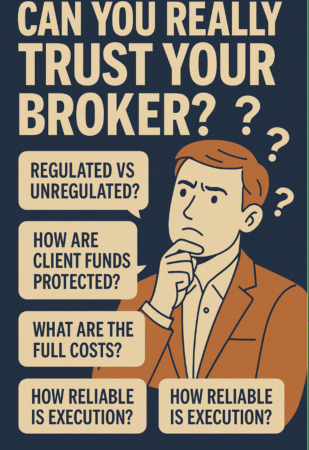This article may contain references to products or services from one or more of our advertisers or partners. We may receive compensation when you click on links to those products or services. Nonetheless, our opinions are our own.
The information presented in this article is accurate to the best of our knowledge at the time of publication. However, information is subject to change, and no guarantees are made about the continued accuracy or completeness of this content after its publication date.
Choosing a broker is one of the most critical decisions a trader or investor makes. Your broker is the gateway to markets, handling your funds and executing your trades, so trust is non-negotiable. Yet, stories of mismanaged accounts, hidden fees, or outright scams persist, raising the question: can you really trust your broker?
In 2025, with markets buzzing with live forex pairs to crypto surges, picking the right partner demands scrutiny. The distinction between a regulated and vs unregulated broker often defines that trust, but it’s just the starting point. This article outlines key questions to ask before committing, backed by market insights and research, to ensure your money and trades are in safe hands.

Why Broker Trust Matters
A broker’s role extends beyond executing orders; they hold your capital, provide platforms, and influence your trading outcomes through spreads, leverage, and support. A trustworthy broker aligns with your goals, while a dubious one can drain accounts through poor practices or fraud. The stakes are high in fast-moving markets like forex, where the XAU/USD price can swing hundreds of dollars intraday, requiring reliable execution to capture gains or cut losses. Regulatory oversight often separates dependable brokers from risky ones, but even regulation isn’t a blanket guarantee. Asking pointed questions helps uncover red flags and ensures alignment with your needs.
Regulated vs Unregulated Brokers: The Core Difference
The choice between a regulated vs unregulated broker shapes your security. Regulated brands operate under strict oversight from bodies like the SEC, FCA, or ASIC, requiring compliance with rules on capital reserves, client fund segregation, and transparent pricing. For instance, FCA-regulated firms must hold client money in segregated accounts, protecting it from broker insolvency. Unregulated brokers face no such mandates, leaving room for practices like fund misuse or manipulative pricing. A 2023 study found that unregulated brokers were linked to 68 percent of reported retail trading scams.
However, regulation varies. Some jurisdictions, like Cyprus, offer lighter oversight, which can blur the line between safety and risk. Always verify the regulator’s reputation and check broker licenses directly on authority websites, not just their claims.
Key Questions to Ask Your Broker
To build trust, ask targeted questions that reveal a broker’s integrity, operations, and fit for your strategy. Here are critical ones, grounded in real-world concerns:
- What’s Your Regulatory Status? Confirm if they’re regular, and check the license number. Ask about compliance with client money protection rules. A regulated broker should provide clear details; unregulated ones may dodge or cite obscure jurisdictions.
- How Are Client Funds Protected? Inquire about segregation practices and compensation schemes, like the FSCS in the UK, which covers up to 85,000 pounds if a regulated broker fails. Unregulated brokers rarely offer such safeguards, risking your capital.
- What Are the Full Costs? Beyond spreads, ask about commissions, swap fees, and hidden charges like inactivity penalties. A 2024 survey showed that 45 percent of traders underestimated fees, eroding profits. Transparent brokers detail all costs upfront.
- How Reliable Is Your Execution? Slippage and requotes can kill profits, especially in volatile markets like XAU/USD. Ask about average execution speeds and slippage rates. Regulated brokers often use tier 1 liquidity providers, minimizing delays.
- What’s Your Conflict of Interest Policy? Some brokers act as market makers, profiting when clients lose. Ask if they operate a dealing desk or pass orders to the market. ECN or STP brokers, often regulated, reduce conflicts by routing trades directly.
- What Happens in a Dispute? Understand their complaint process and whether they’re part of an ombudsman service. Regulated brokers are accountable to ombudsperson bodies; unregulated ones often aren’t, leaving you vulnerable.
Voted "Best Overall Budgeting App" by Forbes and WSJ
Monarch Money helps you budget, track spending, set goals, and plan your financial future—all in one app.
Get 50% OFF your first year with code MONARCHVIP
Broker Trust Factors: A Comparative Snapshot
The table below summarizes key trust factors when evaluating regulated vs unregulated brokers, using data from industry reports and trader feedback in 2025. It highlights measurable differences to guide your questioning.
| Factor | Regulated Broker | Unregulated Broker |
| Fund Security | Segregated accounts, compensation schemes (e.g., FSCS up to £85,000) | Often, no segregation, funds at risk |
| Transparency | Mandated fee disclosures, audited reports | Hidden fees, unclear pricing are common |
| Execution Quality | Average slippage <0.5 pips (ECN brokers) | Slippage >2 pips, frequent requotes |
| Dispute Resolution | Access to ombudsman or regulator oversight | Internal handling, no external recourse |
| Scam Risk | Low (2% of complaints involve fraud) | High (68% of scams tied to unregulated firms) |
| Leverage Limits | Capped (e.g., 30:1 in EU for retail) | Often uncapped, risking overexposure |
Data sourced from regulatory filings and trader surveys. The table underscores why regulation often correlates with trust but isn’t foolproof without deeper checks.
Real-World Applications and Insights
These questions aren’t theoretical; they address real risks. In 2025, forex traders betting on XAU/USD price swings faced issues with unregulated brokers delaying withdrawals during gold’s 30 percent rally, trapping profits. Conversely, regulated brokers like IG or Oanda provided consistent execution, letting traders capitalize on moves from $3,200 to $3,800 per ounce. Social media platforms like X reveal trader complaints about unregulated firms freezing accounts during volatile crypto spikes, reinforcing the need for due diligence.
A practical tip: start with a small deposit to test withdrawal speeds and platform reliability. Check reviews on independent sites, but be wary of fake testimonials. Cross-reference broker claims with regulator databases, like the FCA’s register, to confirm legitimacy. Also, prioritize brokers offering demo accounts to assess execution without risking capital. Research shows traders who vet brokers thoroughly report 40 percent fewer issues than those who don’t.
Challenges in Assessing Trust
Even regulated brokers can fall short. Weak oversight in some regions allows subpar practices, and even top regulators can’t prevent all errors. Unregulated brokers may offer tempting perks like high leverage, but the risks often outweigh benefits, as seen in 2024’s wave of crypto broker insolvencies. Emotional bias 2024’s so cloud judgment; traders chasing low fees might overlook red flags. Regularly revisit your broker’s performance, especially after significant market events, to ensure they meet expectations.
Conclusion
Trusting your broker boils down to asking the right questions and verifying answers against hard evidence. The regulated vs unregulated broker divide offers a starting point, but digging deeper into fund protection, costs, and execution quality separates reliable partners from liabilities.
From navigating countless market cycles, I’ve learned that a broker’s true colors show in volatility, like when a broker spikes on geopolitical news. A disciplined approach, blending these questions with ongoing checks, builds a foundation for confidence. My view: prioritize regulated brokers with transparent practices, but never stop monitoring. In today’s fast markets, trust is earned through scrutiny, today ‘sumed, ensuring your capital stays safe and your trades remain sharp.

Reviewed and edited by Albert Fang.
See a typo or want to suggest an edit/revision to the content? Use the contact us form to provide feedback.
At FangWallet, we value editorial integrity and open collaboration in curating quality content for readers to enjoy. Much appreciated for the assist.
Did you like our article and find it insightful? We encourage sharing the article link with family and friends to benefit as well - better yet, sharing on social media. Thank you for the support! 🍉
Article Title: Can You Really Trust Your Broker? Questions to Ask First
https://fangwallet.com/2025/08/15/can-you-really-trust-your-broker-questions-to-ask-first/The FangWallet Promise
FangWallet is an editorially independent resource - founded on breaking down challenging financial concepts for anyone to understand since 2014. While we adhere to editorial integrity, note that this post may contain references to products from our partners.
The FangWallet promise is always to have your best interest in mind and be transparent and honest about the financial picture.
Become an Insider

Subscribe to get a free daily budget planner printable to help get your money on track!
Make passive money the right way. No spam.
Editorial Disclaimer: The editorial content on this page is not provided by any of the companies mentioned. The opinions expressed here are the author's alone.
The content of this website is for informational purposes only and does not represent investment advice, or an offer or solicitation to buy or sell any security, investment, or product. Investors are encouraged to do their own due diligence, and, if necessary, consult professional advising before making any investment decisions. Investing involves a high degree of risk, and financial losses may occur including the potential loss of principal.
Source Citation References:
+ Inspo
There are no additional citations or references to note for this article at this time.












































